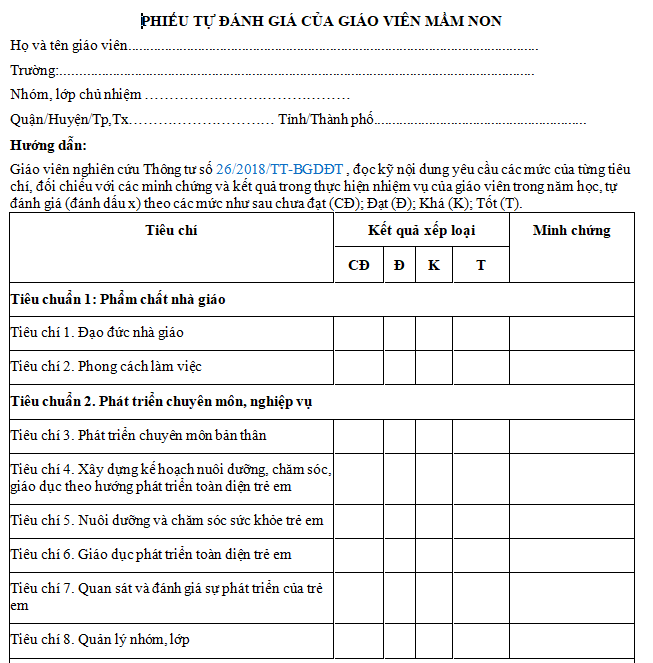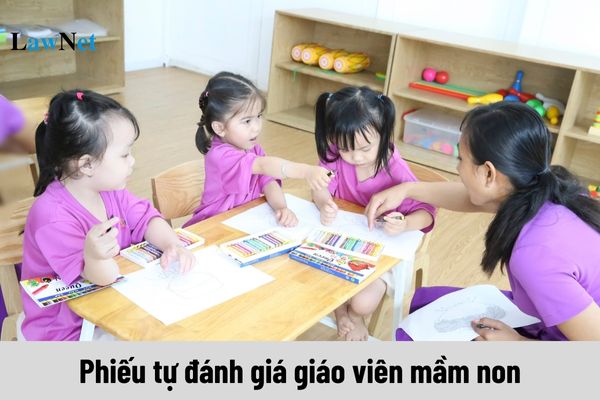What are included in the self-assessment form for preschool teachers in Vietnam according to the latest template?
What are included in the self-assessment form for preschool teachers in Vietnam according to the latest template?
The self-assessment form for preschool teachers is implemented according to the guidance of the Ministry of Education and Training at Form 1, Appendix 2, issued together with Official Dispatch 5569/BGDDT-NGCBQLGD 2018.
To be specific:

Download the self-assessment form for preschool teachers in Vietnam here.

What are included in the self-assessment form for preschool teachers in Vietnam according to the latest template? (Image from the Internet)
What are regulations on assessment period according to the professional standards of preschool teachers in Vietnam?
Based on the regulations at Article 11 of Circular 26/2018/TT-BGDDT, the assessment period according to the professional standards of preschool teachers in Vietnam
- Teachers self-evaluate on an annual period at the end of the school year.
- The head of the preschool institution organizes teacher assessment on a biennial period at the end of the school year.
- In special cases as requested by higher management levels, the preschool institution shortens the teacher assessment period.
15 latest criteria for assessment according to the professional standards of preschool teachers in Vietnam
Based on the regulations in Chapter 2 of the Regulations issued together with Circular 26/2018/TT-BGDDT (some points ceased to be effective by Clause 4, Article 1 of Circular 29/2021/TT-BGDDT), the criteria for assessment according to the professional standards of preschool teachers in Vietnam are specified as follows:
Criterion 1: Teacher Ethics
- Meets the requirement: Strictly adheres to the regulations on teacher ethics;
- Good level: Has a sense of self-study, self-discipline, and strive to improve teacher ethics;
- Excellent level: Is an exemplary model for teacher ethics; shares experiences, supports colleagues in cultivating teacher ethics.
Criterion 2: Working Style
- Meets the requirement: Has an appropriate demeanor and working method for preschool teachers;
- Good level: Has a sense of self-discipline, builds a scientific working style, respects and is close to children and their parents;
- Excellent level: Is an exemplary model of a scientific working style, respects and is close to children and their parents; positively influences and supports colleagues in forming an educational style.
Criterion 3: Professional Development
- Good level: Completes a suitable learning and training plan aligning with personal conditions; updates professional knowledge and requirements to innovate methods and forms of child care and education to enhance the quality of child care and education;
- Excellent level: Shares experiences, guides, and supports colleagues in professional development.
Criterion 4: Developing Nurturing, Caring, and Educational Plans Towards Comprehensive Child Development
- Meets the requirement: Develops a child care and education plan according to the preschool education program, suitable for the developmental needs of children in the group or class;
- Good level: Proactively and flexibly adjusts the child care and educational plans towards comprehensive child development, appropriate to the practical conditions of the school, class, and local culture;
- Excellent level: Participates in developing school education programs; supports colleagues in creating child care and educational plans towards comprehensive child development, appropriate to the practical conditions of the school, class, and local culture.
Criterion 5: Nurturing and Caring for Children's Health
- Meets the requirement: Completes the plan for nurturing and caring for children's health in the group or class; ensures living policies, nutritional policies, hygiene, safety, and disease prevention for children according to the preschool education program;
- Good level: Proactively and flexibly implements new nurturing and health care activities, meeting various developmental needs of children and the practical conditions of the school, class;
- Excellent level: Shares experiences, supports colleagues in implementing nurturing and care activities to improve children's physical and mental health.
Criterion 6: Comprehensive Child Development Education
- Meets the requirement: Completes the educational plan in the group or class, ensuring to support children's comprehensive development according to the preschool education program;
- Good level: Proactively innovates child education methods, flexibly implements educational activities and appropriately adjusts to meet various needs and abilities of children and the practical conditions of the school, class;
- Excellent level: Guides and supports colleagues in implementing and adjusting, innovating educational activities to enhance children's comprehensive development.
Criterion 7: Observing and Evaluating Child Development
- Meets the requirement: Uses observation and assessment methods on children to promptly adjust child care and education activities;
- Good level: Proactively applies flexible methods, forms, and assessment tools to objectively evaluate child development, thereby appropriately adjusting child care and educational plans;
- Excellent level: Shares and supports colleagues in methods of observing and evaluating child development. Participates in external evaluations at preschool institutions.
Criterion 8: Managing the Group/Class
- Meets the requirement: Completes the requirements for child management, facility management, and record management in the group or class according to regulations;
- Good level: Has initiatives in managing group/class activities suitable to the practical conditions of the school, class;
- Excellent level: Shares best practices, supports colleagues in managing groups/classes conformably and suitably to practical conditions.
Criterion 9: Building a Safe, Healthy, and Friendly Educational Environment
- Meets the requirement: Adheres strictly to the regulations on a safe, healthy, non-violent educational environment for children; enforces school rules and codes of conduct;
- Good level: Proactively detects and promptly reflects on, proposes and implements measures to prevent risks to child safety, prevent school violence, and rectify violations of school rules and codes of conduct;
- Excellent level: Shares and supports colleagues in organizing and building a safe, healthy, and friendly physical, cultural, and social environment for children.
Criterion 10: Exercising Democratic Rights in the School
- Meets the requirement: Adheres to regulations on child rights; exercises democratic rights of self, colleagues, and parents or children's guardians according to the school's democratic regulations;
- Good level: Proposes measures to protect children’s rights; exercises democratic rights of self, colleagues, and parents or children's guardians in the school; detects, prevents, and promptly proposes measures to handle violations of democratic regulations in the school (if any);
- Excellent level: Guides, supports, and cooperates with colleagues in exercising regulations on children’s rights; promotes democratic rights of self, colleagues, and parents or children's guardians according to the school's democratic regulations.
Criterion 11: Cooperating with Parents or Children's Guardians and the Community to Improve the Quality of Nurturing, Caring, and Educating Children
- Meets the requirement: Builds a close, respectful, and cooperative relationship with parents or children's guardians and the community in nurturing, caring, and educating children;
- Good level: Promptly cooperates with parents or children's guardians and the community to improve the quality of nurturing, health care, and comprehensive education for children;
- Excellent level: Shares and supports knowledge and skills in nurturing, caring, and educating children for parents or children's guardians and the community. Proposes solutions to enhance cooperation between the school, family, and community.
Criterion 12: Cooperating with Parents or Children's Guardians and the Community to Protect Children's Rights
- Meets the requirement: Builds a close, respectful, and cooperative relationship with parents or children's guardians and the community in implementing regulations on children’s rights;
- Good level: Proactively cooperates with parents or children's guardians and the community to protect children’s rights;
- Excellent level: Shares and supports knowledge and skills in implementing regulations on children’s rights for parents or children's guardians and the community. Proposes solutions to enhance cooperation with parents or children's guardians and the community to protect children’s rights; promptly resolves information from parents or children's guardians related to children’s rights.
Criterion 13: Using Foreign Languages (Preferably English) or Children's Ethnic Languages
- Meets the requirement: Uses basic words and sentences in communications in a foreign language (preferably English); or common communications in ethnic languages for ethnic minority regions;
- Good level: Communicates simple information in a foreign language (preferably English) related to nurturing, caring, and educating children; or fluently communicates in ethnic languages for ethnic minority regions;
- Excellent level: Writes and presents simple paragraphs on familiar topics in a foreign language (preferably English) related to professional activities in nurturing, caring, and educating children; or proficiently uses ethnic languages in ethnic minority regions.
Criterion 14: Applying Information Technology
- Meets the requirement: Uses basic application software in child care, education and group/class management;
- Good level: Develops a number of electronic lesson plans; uses simple technological devices in child care and education activities;
- Excellent level: Shares and supports colleagues in enhancing their ability to apply information technology in child care, education, and group/class management.
Criterion 15: Demonstrating Artistic Ability in Nurturing, Caring, and Educating Children
- Meets the requirement: Demonstrates the ability to create simple visual arts, music, dance, and literature in child care and education activities in the group/class;
- Good level: Creatively applies forms of visual arts, music, dance, and literature in child care and education activities suitable for children in preschools. Organizes holiday and artistic activities for children in preschool;
- Excellent level: Creates an education environment rich in art for children in the group/class and preschool; shares and supports colleagues in demonstrating artistic abilities in nurturing, caring, educating children, and creating an art-rich education environment in the group/class and preschool.

